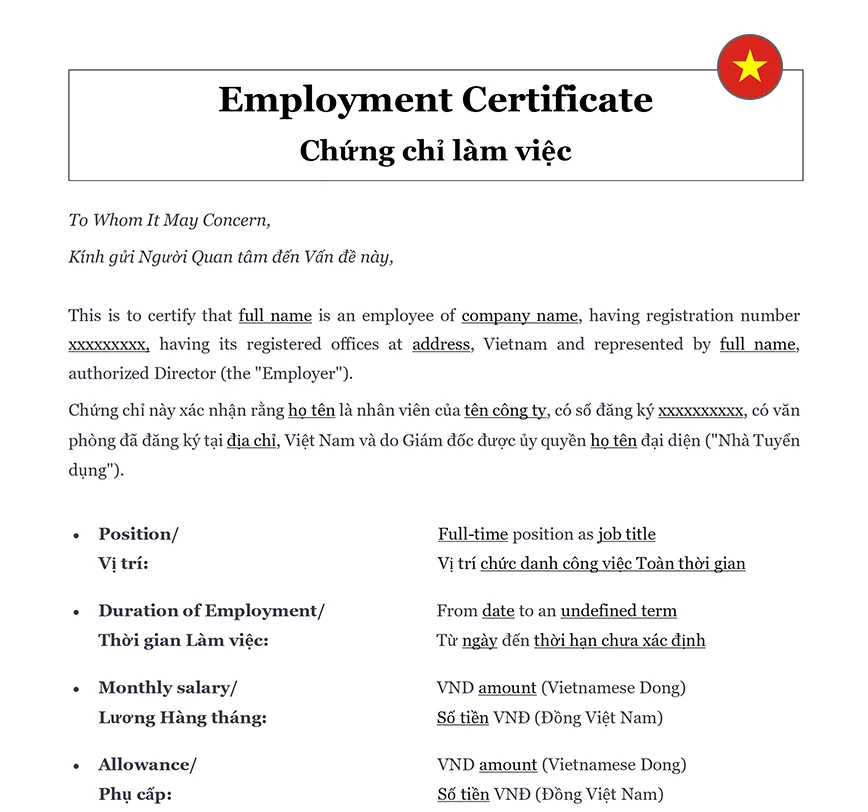Ready to use legal template
Work on without any hassle
Vietnamese-English translation
Ready to use legal template
Work on without any hassle
Vietnamese-English translation
Learn more about Employment Certificate in Vietnam
An Employment Certificate is an official document issued by an employer to confirm an individual’s job position, tenure, and key employment details. It is commonly required for visa applications, bank loans, new job opportunities, or legal and administrative procedures. In Vietnam, an Employment Certificate serves as proof of income and professional status, helping employees fulfill various legal and financial requirements. Employers must ensure that this document is correctly formatted and includes all necessary details to avoid potential issues with authorities or institutions. Download our Employment Certificate, easy to edit in Word format, professionally drafted by legal experts in English and Vietnamese to meet Vietnam’s legal and business standards.
Table of contents
-
What is an Employment Certificate?
-
What is included in Employment Certificate?
-
Why is an Employment Certificate important in Vietnam?
-
What are the legal requirements when issuing Employment Certificates?
-
Is an Employment Certificate necessary when applying for a visa or residency?
-
Can an Employment Certificate be used in legal proceedings in Vietnam?
-
What should I do if my employer refuses to issue an Employment Certificate?
What is an Employment Certificate?
An Employment Certificate, often referred to as a work certificate or employment verification letter, is a crucial document that confirms an individual’s employment history with a specific company. It typically includes essential details such as the employee’s full name, job title, dates of employment, and may also mention the reason for leaving the job. In some cases, it may include additional information such as salary details or performance evaluations. Employers issue these certificates to employees upon request, and they are often required for various purposes, including applying for a new job, renting a property, or applying for a visa.
In Vietnam, an Employment Certificate is particularly significant as it also serves as proof of employment for social security and other legal purposes. These certificates are issued in compliance with Vietnamese labor laws and often include specific language to attest to the employee’s conduct and performance during their employment. Employers must provide these certificates to employees who request them, and they play a crucial role in ensuring transparency and fairness in employment practices.
What is included in Employment Certificate?
An Employment Certificate typically includes several key pieces of information about the employee and their employment history. Here’s a breakdown of what is commonly included:
1. Employee Information: An Employment Certificate typically includes the employee’s full name, job title or position, employee identification number (if applicable), and dates of employment (start and end dates).
2. Employer Information: It also contains the employer’s information, such as the company name, company address, and contact information (phone number, email).
3. Employment Details: The certificate outlines the employee’s job responsibilities or duties, along with details about their salary or wage and employment status (full-time, part-time, temporary, etc.).
4. Reason for Leaving (if applicable): It may also indicate the reason for leaving, whether the employee resigned, was terminated, or left for other reasons.
The exact contents of an Employment Certificate can vary depending on the country’s regulations and the employer’s policies. However, the above information is typically included to verify an individual’s employment history.
Why is an Employment Certificate important in Vietnam?
Proof of Employment: It serves as official documentation that an individual is or was employed by a specific company. This is essential for verifying employment history and tenure.
Visa and Work Permit Applications: Foreign employees often need employment certificates for visa renewals, work permit applications, and residency permit processes. This document confirms their employment status and the legitimacy of their work in Vietnam.
Bank and Loan Applications: Banks and financial institutions may require an employment certificate to process loan applications, credit card issuances, and other financial services. It helps verify the applicant’s employment status and income stability.
Social Insurance and Benefits: Employment certificates are necessary for processing social insurance claims and other employment-related benefits. They provide evidence of an individual’s work history and contributions to social insurance funds.
Career Advancement: Employees may need employment certificates when applying for new jobs, promotions, or educational programs. These certificates verify their experience and qualifications to potential employers or educational institutions.
Legal Compliance: Vietnamese labor laws may require employers to issue employment certificates to employees upon request. This ensures transparency and compliance with legal requirements.
Tax Purposes: An employment certificate can be used to confirm an individual’s employment status and income, which is important for tax filing and compliance.
Employment Disputes: In cases of employment disputes or legal claims, an employment certificate can serve as evidence of employment terms, duration, and the nature of the work performed.
What are the legal requirements when issuing Employment Certificates?
In Vietnam, specific legal requirements govern the issuance of Employment Certificates, as outlined in the Labor Code and related regulations. Employers must adhere to these requirements when issuing Employment Certificates to employees. Key legal requirements include:
| ➤ Accuracy: Information in the Employment Certificate must be accurate, reflecting the employee's true employment history. |
| ➤ Timeliness: Certificates should be issued promptly upon request, typically within a reasonable period, such as 15 days. |
| ➤ Contents: Certificates must include essential information, such as the employee's full name, job title, dates of employment, and reason for leaving (if applicable), as well as the employer's details. |
| ➤ Language: Certificates should be in Vietnamese or bilingual (Vietnamese and another agreed-upon language). |
| ➤ Signature: The certificate must be signed by an authorized representative of the employer, like the HR manager or company director. |
| ➤ Confidentiality: Information in the certificate should be treated as confidential and not disclosed to third parties without the employee's consent. |




